Supporting surgeons is key theme at RCSI Charter Day Meeting

The annual RCSI Charter Day Meeting began in the College on Thursday, 11 February and continued until Saturday, 13 February. More than 600 surgeons and guests visited the College over the three days. The overall theme for the meeting was ‘Supporting Surgeons’ which will focus on the challenging surgical practice environment and how best the College can support the surgical profession.
Speaking on the Charter Day Meeting, Mr Declan J. Magee, RCSI President said: ‘Modern healthcare places many demands on surgeons who are expected to be technical experts, skilled communicators, managers, supportive teachers, trainers and mentors and researchers. A high standard of performance is expected at all times in each of these roles, which can place demands and stresses on individuals. In this fast paced, complex world we all live in, we must ensure the right support structures and systems are in place to provide professional and personal support to surgeons should difficulties arise. This year at the Charter Day Meeting, we explored the theme of ‘Supporting Surgeons’ to meet these complex demands.”
‘Unravelling the Chaos: Reengineering Hospitals to Enhance Patient Flow’ will focus on leadership and behaviours across all disciplines as well as process change. The concept of reengineering has been applied internationally in a number of health systems, whereby it reviews the processes of care delivery, offering a means of improving performance together with wider system reform, health service reconfiguration and implementation. Knowledge gained from the Clinical programmes has shown that system processes underlying clinical care in Ireland do not result in well planned, coordinated patient journeys. A fresh view of the changing nature of the demand for health care services is required alongside new models of providing care to meet that demand.
The 26th Annual Videosurgery Meeting and the 10th Intercollegiate Case Presentations also took place on the Thursday.
The main Charter Day Meeting began on Friday, 12 February with parallel sessions running for most specialties. In the afternoon, Vice Admiral Mark Mellett, Chief of Staff, Óglaigh na hÉireann, Defence Forces Ireland delivered the Johnson and Johnson Lecture entitled ‘Leadership Challenges in a Complex World’.
As part of the Charter Day Meeting, the Department of Surgical Affairs announced the launch of the new Surgical Affairs Strategy 2016 – 2020. Mr Eunan Friel, Managing Director, RCSI Department of Surgical Affairs said ‘Neither healthcare delivery or healthcare training stands still therefore, we must constantly refocus our efforts to better support both the training and the profession of surgery. It is the College’s role to prepare our surgical trainees to lead the delivery of surgical care, to support surgeons in practice and to help inform and shape policy. The new strategy for the Department of Surgical Affairs supports these imperatives in order to ensure high standards in the training and practice of surgery.’
On the Friday evening, Professor Mike Griffin, Professor of Gastrointestinal Surgery in the Royal Victoria Infirmary in the UK will be awarded an Honorary Fellowship from the College and will deliver the 92nd Abraham Colles Lecture. His lecture entitled ‘Talking to Cancer Patients’ focused on the importance of communication when looking after patients with cancer. Prof Griffin has more than 25 years’ experience treating patients with Oesophagogastric cancer. He was awarded an OBE for services to cancer healthcare in the 2013 Queen Elizabeth II Birthday Honours list.
On Saturday, 13 February the Charter Day Meeting will continue with the annual meeting of the Irish Higher Surgical Training Group.
On Saturday evening, President of Ireland, Michael D. Higgins was be awarded an Honorary Fellowship from the College and a black-tie dinner will be held in the College to close the Charter Day Meeting events.
The RCSI Charter Day Meetings are held annually to commemorate the 11 February 1784, when RCSI was first established by Royal Charter by King George III.



